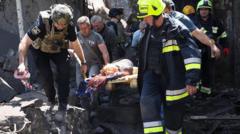In a critical phase post-civil war, President Ahmed al-Shara outlines his plans for Syria's recovery, emphasizing the importance of foreign alliances.
### Syria's New Leadership: Ahmed al-Shara Eyes Global Support

### Syria's New Leadership: Ahmed al-Shara Eyes Global Support
**Former Rebel Leader Calls for International Cooperation and Financial Aid in Efforts to Stabilize the Nation.**
---
As Syria emerges from its tumultuous civil war, President Ahmed al-Shara, a former rebel leader, is leaning heavily on international diplomacy to secure his government's future. In a compelling interview with The New York Times, Mr. al-Shara articulated his urgent need for support from the United States and other allies to ensure Syria’s stability and prevent a return to chaos.
Since assuming leadership following the overthrow of President Bashar al-Assad in December, al-Shara acknowledges that his previous dynamics with foreign powers have dramatically shifted. Previously reliant on Turkey's backing, al-Shara now finds himself navigating a complex geopolitical landscape where foreign support not only welcomes but is essential for national survival.
Al-Shara's administration is particularly focused on rectifying the country's dire economic situation, which has been exacerbated by heavy sanctions imposed by the West, likely influenced by his jihadist affiliations. He is actively seeking the lifting of these sanctions to foster economic recovery, urging Western officials to recognize that the future stability of Syria could impact stability across the broader Middle East.
In his plea, al-Shara highlighted the urgency of military assistance to form a cohesive and effective army to maintain peace. Additionally, he stressed the necessity of foreign funding to sustain public services and civil order within the government. “Any chaos in Syria will damage not just neighboring countries but the whole world,” al-Shara warned, reinforcing the notion that Syria's fate is inextricably linked to regional and global stability.
As al-Shara embarks on this multifaceted diplomatic mission, his ability to forge new alliances while overcoming past challenges will be pivotal in reshaping both the future of Syria and relations with powerful international entities.
As Syria emerges from its tumultuous civil war, President Ahmed al-Shara, a former rebel leader, is leaning heavily on international diplomacy to secure his government's future. In a compelling interview with The New York Times, Mr. al-Shara articulated his urgent need for support from the United States and other allies to ensure Syria’s stability and prevent a return to chaos.
Since assuming leadership following the overthrow of President Bashar al-Assad in December, al-Shara acknowledges that his previous dynamics with foreign powers have dramatically shifted. Previously reliant on Turkey's backing, al-Shara now finds himself navigating a complex geopolitical landscape where foreign support not only welcomes but is essential for national survival.
Al-Shara's administration is particularly focused on rectifying the country's dire economic situation, which has been exacerbated by heavy sanctions imposed by the West, likely influenced by his jihadist affiliations. He is actively seeking the lifting of these sanctions to foster economic recovery, urging Western officials to recognize that the future stability of Syria could impact stability across the broader Middle East.
In his plea, al-Shara highlighted the urgency of military assistance to form a cohesive and effective army to maintain peace. Additionally, he stressed the necessity of foreign funding to sustain public services and civil order within the government. “Any chaos in Syria will damage not just neighboring countries but the whole world,” al-Shara warned, reinforcing the notion that Syria's fate is inextricably linked to regional and global stability.
As al-Shara embarks on this multifaceted diplomatic mission, his ability to forge new alliances while overcoming past challenges will be pivotal in reshaping both the future of Syria and relations with powerful international entities.






















